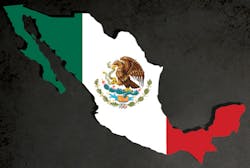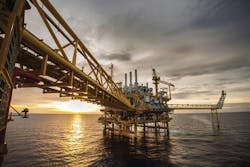SME investment in Mexico
MEXICAN OIL AND GAS SECTOR IS EMBRACING OUTSIDE SKILLS, TECHNICAL SUPPORT, AND INNOVATION
LO VAN WACHEM, ADIL, ABERDEEN, SCOTLAND
IT'S ALL ABOUT confidence: Mexico may be a rarity in the current global climate in that, on the surface, it appears there is more finance available than there are good opportunities in which to invest. However, drill a little deeper down, and it's evident that while opportunities certainly exist in abundance, what's missing is the knowledge and experience needed to translate them into profitable developments that investors have the confidence to back.
In 2013, Mexico approved a series of constitutional reforms aimed at strengthening the economy and fostering competition. Reforming the energy sector in that country was perceived as central to achieving these objectives. After almost 80 years of monopoly control over the energy sector in Mexico, in the form of Pemex and CNH, the entire industry is now open to private sector participation in all forms.
Refreshingly, there is a real thirst across the burgeoning Mexican oil and gas sector to embrace outside skills, technical support and innovation, more so than any other region to date. This willingness to use outside experience has opened the door to a world of possibility for Mexico's newly formed independent operators.
While casting a shadow over Mexico's short-term prospects and slightly reducing immediate growth prospects, the collapse of oil price has not resulted in a radical change to its long-term investment plans, thanks in the main to the buffer provided by the diversity of its overall economy.
Instead, it has provided an opportunity for smaller Mexican SMEs to participate in the energy opening and boost productivity. The steep learning curve is in raising themselves up to international standards and overcoming the shortage of skills and competencies they require as an operator or even as a non-operating venture partner.
More capital, technology, and expertise are needed in order to develop Mexico's most challenging resources, including deepwater and unconventional reservoirs. Key to unlocking the region's potential is helping these small operators and their investors see the value in the licenses they are bidding for.
Crack this and not only will individual companies realize their growth aspirations but significant value can be delivered to the country as a whole.
BIGGER PICTURE
Sierra Oil & Gas, poised to become Mexico's first private crude producer in seven decades, had never drilled a well when ADIL was brought in to help develop its business case ahead of the first oilfield auction in 2015.
The only winning bidder in the end, Sierra benefited from the ability to model the blocks that they were interested in, come up with concepts for the blocks that met key performance indicators (KPIs) and, once modeled, to run value scenarios and sensitivities against those in a cost and time efficient manner.
Sierra could explore the impact of tying back to another asset, or consider the impact of processing onshore. In total ADIL developed 31 models for Sierra, and against all of them, ran those sensitivities in production profiles, in phasing, in different KPIs - allowing Sierra to see the value in the different blocks and bid appropriately.
Ultimately, it allowed the company to better understand the value of the licenses because it was able to look beyond individual licensing blocks, to take an entire area and understand where further value could be leveraged.
As a result, Sierra gave its investor the confidence to bid by producing a business case that was transparent, auditable, expansive, credible, independent, and benchmarked.
This is a common area which firms are not consistently exploiting, focusing instead on each individual license. Understanding the true value of the license you are bidding for can only be done in conjunction with consideration of what you can do for the other blocks.
TECHNOLOGY AND SKILLS
Coupled with the need to think big is the urgency of tackling the shortage of experienced people as business takes off. The Comisión Nacional de Hidrocarburos (CNH) has said as many as 135,000 new engineers will be needed within the next five years.
The existing base of experienced engineers are well educated and motivated, but ultimately stunted by their organizations inability to invest, make decisions, and pass authority down the line. When it comes to developing the business case, there is no substitute for tapping into the global base of expertise that exists beyond Mexico's borders, something that has been readily recognized and willingly embraced by the fledgling sector.
Use of technology has also been relatively basic to date, adopting the "drill a hole and suck until it's empty" approach. The concept of using waterflood, gas injection, or gas lift is under-utilized but offers significant opportunity in terms of maximizing production through relatively simple support.
In addition to people and technology, there is also limited experience in marginal and deepwater environments, with only around a very small number of wells drilled in the Mexican portion of the Gulf of Mexico compared with the US side.
Concepts like subsea tiebacks, ERD, FPSOs, TLPs, and the like are a world away from what the majority of Mexican SMEs have contemplated to date. Clearly, the deeper you go the costlier these developments are, the longer they take to develop, and the less appealing they become to an independent, but this is an area with significant growth potential and demonstrating an ability to think in those terms is important.
Ultimately, the biggest issue with this jigsaw of skills and capabilities is the ability to successfully integrate all the disciplines.
Smaller independents rarely have elephant fields and will nearly always focus on commercially and/or technically challenging prospects. Added to this is the complexity that many Mexican companies have subsurface teams and funding but little else.
Understanding how to plan a campaign, evaluate development concepts, apply innovation and technology, calculate cost, identify risk, and determine where the value lies is at the heart of giving investors the confidence to bid.
The best approach is the use of experienced people with tools that provide insight into development concept possibilities so operators quickly understand where the opportunity is and provide the support that shareholders are looking for.
Achieving this within an overall project development focus that is not bound by any one specific discipline means smaller operators can make the best use of what they already have in-house while developing their people, growing their business, and tapping into the processes and capabilities they need for the growth chain.
The ability to provide processes, assurance, and governance throughout-from a staged gate process to a business management system-is equally critical in giving small operators transparency and visibility of the governance process to their private equity or funders.
LAND OF OPPORTUNITY
The World Bank estimates it takes just six days to start a business in Mexico, far less than China, Brazil, or most of Latin America. The process that CNH embarked on has been fast but open and transparent. Every step of the way they are learning and adjusting the terms which we believe will encourage more and more companies to enter the sector and reverse the current production decline in Mexico.
As an international organization, we see real opportunity for partnerships in-country and have invested in the creation of a new office in Mexico City. From there we are in discussions with some of the winners of round R1.3 to help them develop subsurface modelling, look at the development concepts, price and and provide economics; and ultimately, work with them on appraisal and exploration campaigns. We are in talks with some of the winners of round R1.2 with a view to becoming a technical partner and assisting with peer reviews.
While the focus is on the smaller independent operators, it would be remiss to ignore that Pemex, too, has a need for technical support and innovation, health and safety guidance and due diligence of the infrastructure they need to use that others now own.
We are talking to them to offer support regarding process safety to help define the regulatory framework and, providing the experience we have globally, to set the framework in which they can develop the regulations in Mexico under which the new operators should function.
Mexico's oil output has slid for 11 consecutive years while crude prices have fallen about 70% since 2014, both of which have taken a toll on public finances. To counteract this, the oil and gas industry is trying to shift to another level by learning from the experiences of others.
If you have the right skills to bring to the table, Mexico truly is a land of opportunity.
ABOUT THE AUTHOR
Lo Van Wachem is developments manager at oil and gas consulting company ADIL. With nearly 30 years' experience in oil and gas and subsea construction, including senior roles in a variety of technical, operations, and management disciplines, Van Wachem has been involved in the delivery of projects ranging from early conceptual studies through to the execution of major construction projects. He has worked across a number of different operating regimes including Brazil, West and North Africa, the Far East, Denmark, Norway, Holland, and the UK.



